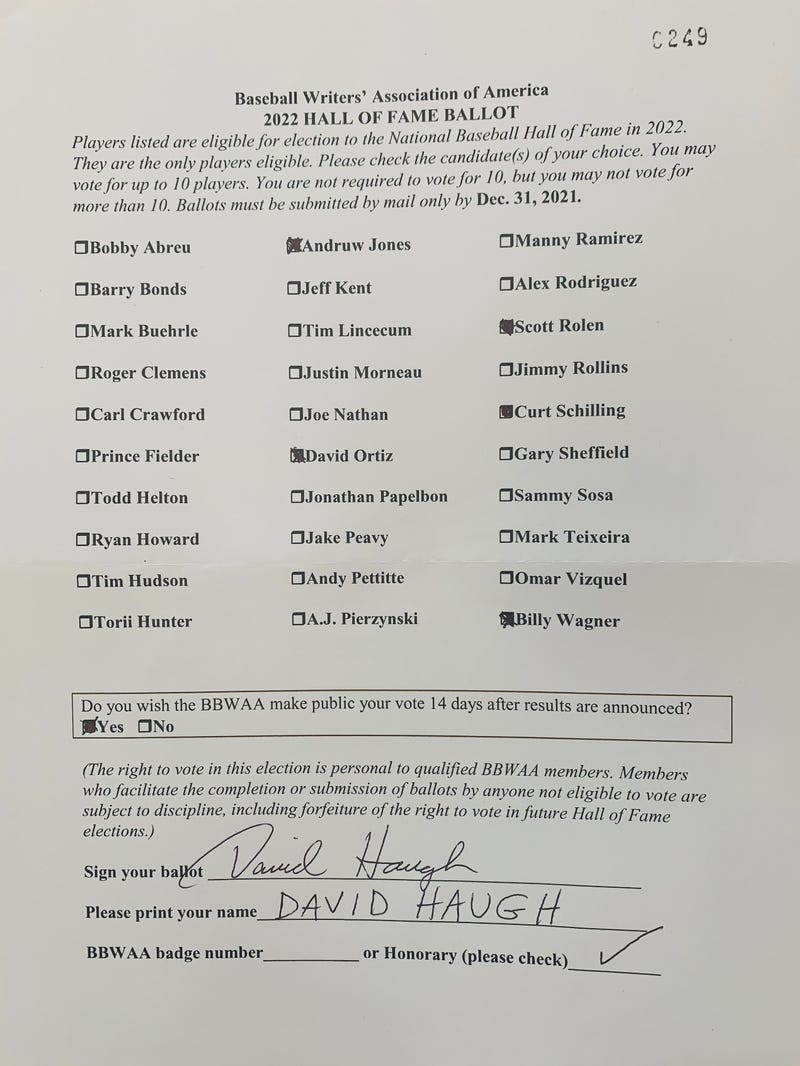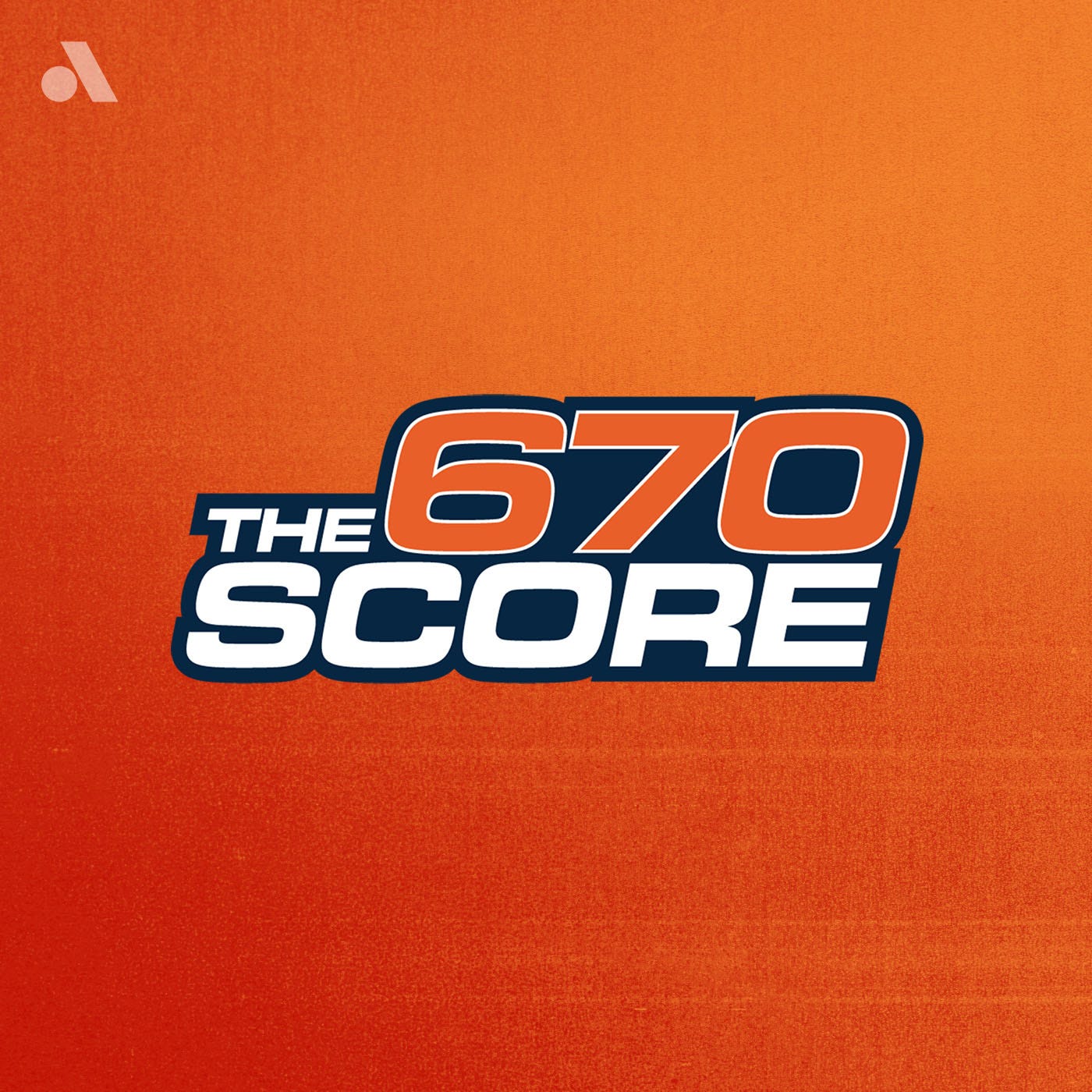
(670 The Score) Of all the introspection the annual Baseball Hall of Fame vote induces, never did I think my biggest dilemma on the 2022 ballot would come down to a question asked regularly around baseball.
How much do I trust commissioner Rob Manfred?
Manfred all but exonerated Red Sox legend David Ortiz of the alleged use of performance-enhancing drugs, accusations that have clouded Ortiz’s legacy since a 2009 New York Times story linking him to a positive drug test six years earlier. Ortiz was among the 104 MLB players who tested positive for PEDs, records, the Times reported, which were said to have been destroyed.
Ortiz later admitted taking an over-the-counter supplement for nutrition, which created plausible deniability for him that many embraced, including Manfred. The MLB Players Association, for example, also pointed out a discrepancy between the number of positive tests (96) and samples seized (104). The league issued a statement urging caution jumping to conclusions about the players named given the “uncertainties inherent in the list."

Ortiz’s name never appeared in the Mitchell Report or any other probe. And Manfred perhaps supplied the slugger’s strongest endorsement when addressing the issue in an interview five years ago before Ortiz’s final game at Fenway Park.
“Even if Rob Manfred’s name was on that list, he might have been one of those 10 or 15 where there was probably, or possibly, a very legitimate explanation that did not involve the use of a banned substance," Manfred told USA Today in 2016.
Manfred reiterated Ortiz never flunked a drug test since MLB implemented its drug policy in 2004.
Support from baseball’s commissioner carries weight. It made me wonder whether less suspicion would surround Sammy Sosa’s Hall credentials had Cubs ownership gone as far supporting Sosa. But back to Ortiz, whose statistics over the course of his 20-year career scream Cooperstown.
The .286 lifetime hitter blasted 541 home runs, drove in 1,768 runs, collected 2,472 hits and made 10 All-Star appearances. Honored eight times as the league’s best designated hitter, Ortiz also retired with three World Series rings and a reputation for one of October’s most clutch hitters ever.
Ortiz is the only newly eligible candidate among the 13 to make my 2022 ballot. I checked four other boxes in my third year of having the privilege of voting for the Hall as a member of the Baseball Writers’ Association of America: Curt Schilling, Scott Rolen, Billy Wagner and Andruw Jones.
After voting for Omar Vizquel in 2020, I dropped him from the ballot this year until more clarity exists about disturbing allegations of sexual harassment and domestic violence. I strongly considered relievers Joe Nathan and Jonathan Papelbon. I smiled seeing the names of ex-White Sox stars A.J. Pierzynski and Jake Peavy, two fascinating guys to cover with Hall of Fame personalities, if not credentials.
Locally, former White Sox left-hander Mark Buehrle remains one of my favorite Sox players ever, but that alone still isn’t a compelling enough reason for me to adjust the criteria for entry. Below, I explain my thinking on Buehrle as well as my rationale for leaving Alex Rodriguez, Roger Clemens and Barry Bonds off the ballot.
To get the Hall of Fame nod, candidates must receive at least 75% of the vote and can remain on the ballot if they don't. The qualifications for the four eligible candidates I endorsed, in addition to Ortiz, haven’t changed since I voted for them a year ago.
THOSE WHO MADE IT
David Ortiz
See explanation above.
Curt Schilling
Schilling asked to be taken off the ballot, but -- weighing professional accomplishments without factoring in his polarizing personal beliefs -- it’s easy to see why he wasn’t dropped. He earned baseball immortality. His statistics make a declarative statement that he belongs in Cooperstown.
One of October’s best pitchers ever offers impressive credentials. Schilling allowed two or fewer earned runs in 16 of his 19 postseason starts. In five playoff elimination games, Schilling allowed six total runs and his team won every start. Overall, Schilling went 11-2 with a 2.23 ERA and 0.97 WHIP in those 19 playoff starts. He became as dependable every autumn as fall foliage, winning three World Series rings, the 2001 World Series co-MVP and the 1993 NLCS MVP. His 3,116 strikeouts rank 15th all-time, and his 80.5 WAR is the highest for any pitcher besides Roger Clemens not currently in the Hall of Fame. He finished 216-146 with a 3.46 ERA – similar regular-season numbers to Buehrle but with postseason success that elevates his candidacy.
Billy Wagner
Wagner suffers from the tradition of relievers being viewed differently than starters when evaluating their historical value. But no pitcher since 1900 with at least 900 innings pitched allowed fewer hits per nine innings than Wagner – 5.99. Wagner’s strikeout rate of 11.92 per nine innings ranks first among pitchers with at least 900 innings. The lefty flamethrower owns the lowest WHIP of any pitcher of the modern era with at least 900 innings – 0.998. His career 2.31 ERA ranks atop the list of left-handed relievers who have thrown at least 900 innings. In 16 seasons, Wagner saved 422 games and converted 85.9% of his opportunities, numbers that make him more than worthy of induction.
Scott Rolen
Nobody really talks about Rolen’s offense, but he had eight straight seasons with an .846 OPS or better – something no other third baseman in history has done. Among third basemen, only Mike Schmidt won more Gold Gloves (10) than Rolen (eight) and had at least a 120-plus OPS+ at the plate. Rolen ranks ninth among third basemen in all-time WAR (70.1) behind seven Hall of Famers and likely future enshrinee Adrian Beltre, and he hit 316 home runs in 17 seasons, offensive pop that complemented his defensive excellence. Injuries perhaps shortened and marred his career but not enough to deprive Rolen of a spot in Cooperstown.
Andruw Jones
The same logic on Vizquel applies to Jones, who defined his position defensively for the better part of a decade and contributed to a long Braves run of success. Jones won 10 Gold Gloves, a rare feat that among outfielders has been accomplished only by future Hall of Famer Ichiro Suzuki and current enshrinees Willie Mays, Roberto Clemente, Ken Griffey Jr. and Al Kaline. His career declined sharply after his 30th birthday, but through his age-29 season, only Alex Rodriguez, Eddie Mathews and Griffey had hit more home runs at that point of their careers than Jones, whose flame burned brightest during his prime from 1998-2007. He hit 434 career home runs, making him the only center fielder ever with at least 400 home runs and a dWAR of 24.0 or higher.
THOSE WHO DIDN’T MAKE IT
Mark Buehrle
As starting pitchers become less and less durable and the job description evolves, perhaps the changes will improve Buehrle’s chances. Consistency and durability were among his biggest assets. Buehrle never was a 20-game winner in an era when that meant something more than it does today. He never won a Cy Young award and finished his career with a 3.81 ERA. He only struck out 5.6 batters per nine innings. At the peak of Buehrle’s career, his combined seven-year WAR totaled 35.8 – well short when compared with the average of 50.0 among Hall of Fame pitchers. He topped 5.0 WAR just four times, and his career WAR of 59.1 ranks 69th among starting pitchers.
The perfect game and no-hitter combined with 15 seasons of double-digit victories makes Buehrle’s spot on the ballot legitimate. The only three other pitchers with those credentials are Hall of Famers Warren Spahn, Nolan Ryan and Randy Johnson. On the other hand, of the 21 pitchers to throw perfect games since 1901, only seven are in the Hall. The argument for Buehrle’s enshrinement is a good one — just not good enough yet from this vantage point.
The cheaters
I explained why I considered Ortiz an exception to this rule, but I did think long and hard again about the candidacies of Barry Bonds and Roger Clemens especially – it’s their last year on the ballot – as well as Rodriguez, Sosa, Manny Ramirez, Gary Sheffield and Andy Pettitte. None of them have the plausible deniability that Manfred afforded Ortiz. It’s complicated separating statistics from the suspicions.
Baseball’s caretakers could address this annual, uncomfortable dance with doubt for Hall voters.
I’m all for the addition of a wing in Cooperstown to include tributes to players whose credentials don’t pass the smell test. I openly acknowledge you can't write the history of baseball without including those whose career accomplishments carry legitimacy concerns. I admit not knowing how many other players gained entry into the Hall of Fame despite cutting corners or bending rules and respect the presumption of innocence. But it's a baseball museum and not a courtroom, so the criteria remains subjective. And to this voter, leaving those implicated by convincing evidence linking them to performance-enhancing drugs off the ballot felt like the right thing to do.
David Haugh is the co-host of the Mully & Haugh Show from 5-9 a.m. weekdays on 670 The Score. Click here to listen. Follow him on Twitter @DavidHaugh.
